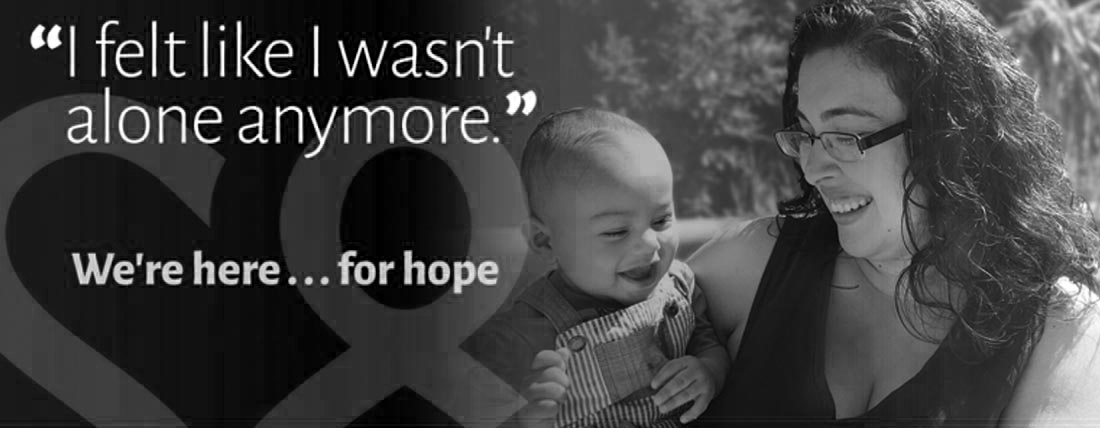Mercedes’ Story

Mercedes had a full plate. She juggled being a new mom of a 7-month-old while starting her career. Her father had died in 2011, and in the years since, she had noticed changes in her mother’s behavior – subtle ones at first, but it became evident that something was not right.
“They had been together for 30-plus years, so when he passed away she got very sad,” Mercedes says. “But she didn’t cry. We thought that was weird, but maybe that was just her way of grieving. She just seemed out of it, like she wasn’t there.”
“I studied to be a journalist, so I’m always trying to figure out what’s wrong,” Mercedes says. “The more I learned, the more I thought it might be dementia. But she was young. People think dementia is what happens to old people. I didn’t know what dementia was and how it would play out.”
By then, Mercedes was pregnant, juggling work with her own medical visits and the “trying to figure out what’s wrong with Mom” doctors’ appointments. Eventually a neurologist made the diagnosis… Mercedes’ mother had frontal lobe dementia.
“When we received the diagnosis, we found a new apartment with more room so we could move my mom in with us,” Mercedes says. “Now I was caring for both my baby and my mom. That was an adventure.”
Mercedes had landed her first journalism job, an entry-level position that didn’t pay well. A babysitter watched her son and her mother during the day, but as her mother’s condition progressed, it became clear the arrangement wouldn’t last. It was going to cost more to provide care for her baby and mother than she was making at work.
“I was happy to be taking care of my mom, and spending time with my son,” Mercedes says. “But I got really lonely. I couldn’t go out at all. My friends with babies were always doing stuff together — play dates, going to the park.”
Caring for her mother and child simultaneously was especially challenging.
“The one time I tried to go the park with my baby and my mom, it was a disaster. My son would run one way, and my mom would wander off another. When I finally could grab my son, I turned around and my mom was nowhere to be seen,” Mercedes says. “She finally came back, eating a slice of pizza. Behind her I saw an older man with an empty pizza box. He said my mom just took a piece from his box. That was scary.”
While she doesn’t want to play the “blame game,” Mercedes found she was getting no help from other family members. In the Latino culture, she says, it’s the daughter who is expected to care for parents.
She felt alone and overwhelmed.
“As I was researching dementia, I came across Alzheimer’s Los Angeles,” Mercedes says. “I called up and asked if there was anyone there who spoke Spanish and could come explain dementia to me and my family. They said yes, and Alicia came out to our apartment and gave a great presentation in Spanish to me, my brother, my aunt, and uncle. At the end, everyone was in shock. We had no idea what we were in for.”
Alicia told Mercedes about a support group Alzheimer’s Los Angeles offered for young adult children who care for their parents. That support group was just what Mercedes needed to help manage her situation — and to know she wasn’t alone.
“It was so helpful to get together with others who were doing what I was doing,” she says. “I was the youngest one. But I felt like I wasn’t alone. There are others doing the same thing as me.”
Mercedes says the support she received from Alzheimer’s Los Angeles helped her get through the most difficult period of her life. “I always thought I’d see her grow old. I didn’t have enough time with her. Not learning her recipes. Not seeing her play with her grandchildren. As the dementia progressed, our roles switched… quickly, and at first I wasn’t ready for that.”
Now, she hopes others can benefit from the lessons of her experience.
“If you think there is something wrong, you’ve got to be an advocate for your parent,” Mercedes says. “I was a really big advocate for my mom. At the same time, you have to remember that you have your own life. You’ve got to learn to be patient. You have to let it be. You can’t get frustrated with things you know the person can’t control. Just go with it.”
Thankfully Mercedes found our free Care Counseling program and joined one of our support groups.
Today, she’s no longer alone. We’re there facing this with Mercedes… together.
